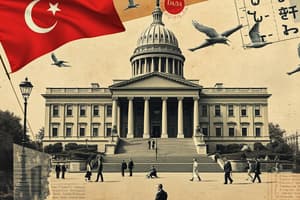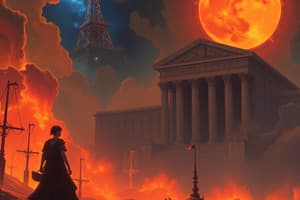Podcast
Questions and Answers
What is a characteristic of elections in a liberal democracy?
What is a characteristic of elections in a liberal democracy?
Elections in a liberal democracy are free, fair, and competitive.
How does populism perceive society?
How does populism perceive society?
Populism views society as divided into 'the pure people' and 'the corrupt elite'.
What challenges do liberal democracies face in relation to minority rights?
What challenges do liberal democracies face in relation to minority rights?
Liberal democracies often face challenges with the selective suppression of political and civil rights.
What ideological combination characterizes radical left-wing populism?
What ideological combination characterizes radical left-wing populism?
In what way does populism challenge liberal democratic principles?
In what way does populism challenge liberal democratic principles?
How does populism relate to constitutionalism?
How does populism relate to constitutionalism?
What is a key aspect of personal leadership within flawed democracies?
What is a key aspect of personal leadership within flawed democracies?
How does populism interact with liberal culture in societies?
How does populism interact with liberal culture in societies?
What does the principle of 'no one is above the law' imply in a liberal democracy?
What does the principle of 'no one is above the law' imply in a liberal democracy?
How does the trias politica model contribute to the rule of law?
How does the trias politica model contribute to the rule of law?
What role does the judiciary play in a liberal democracy?
What role does the judiciary play in a liberal democracy?
Describe the concept of 'due process' in a liberal democracy.
Describe the concept of 'due process' in a liberal democracy.
What distinguishes civil rights from social rights?
What distinguishes civil rights from social rights?
How does illiberal democracy differ from liberal democracy?
How does illiberal democracy differ from liberal democracy?
What are the mechanisms that uphold the rule of law in a liberal democracy?
What are the mechanisms that uphold the rule of law in a liberal democracy?
Explain the significance of 'equality before the law' in liberal democracy.
Explain the significance of 'equality before the law' in liberal democracy.
Flashcards
Trias Politica
Trias Politica
A system of government where power is divided among three branches: legislative, executive, and judicial.
Politicization of Trias Politica
Politicization of Trias Politica
When political actors involve or influence the judicial branch.
Liberal Democracy
Liberal Democracy
A form of government combining democratic principles (power to the people) and liberal values (individual freedom).
Rule of Law
Rule of Law
Signup and view all the flashcards
Constitution
Constitution
Signup and view all the flashcards
Independent Judiciary
Independent Judiciary
Signup and view all the flashcards
Due Process
Due Process
Signup and view all the flashcards
Individual Rights & Freedoms
Individual Rights & Freedoms
Signup and view all the flashcards
Liberal Democracy Characteristics
Liberal Democracy Characteristics
Signup and view all the flashcards
Flawed Democracies/Electoral Authoritarianism
Flawed Democracies/Electoral Authoritarianism
Signup and view all the flashcards
Populism Definition
Populism Definition
Signup and view all the flashcards
Radical Left-Wing Populism
Radical Left-Wing Populism
Signup and view all the flashcards
Radical Right-Wing Populism
Radical Right-Wing Populism
Signup and view all the flashcards
Populism and Liberal Democracy
Populism and Liberal Democracy
Signup and view all the flashcards
Populism and Constitutionality
Populism and Constitutionality
Signup and view all the flashcards
Populism and Popular Sovereignty
Populism and Popular Sovereignty
Signup and view all the flashcards
Study Notes
NO ONE IS ABOVE THE LAW
- This is a lecture from iPOL, week 12.
- The lecture's topic is the concept that no one is above the law.
DUTCH POLITICS 101
- This is a signup for a Dutch Politics seminar.
- Representatives from GroenLinks, PVDA, VOLT, and D66, plus workshops with professors, will be present.
- The session will be on November 20th, 5:00 PM.
- Location is Bar Bukowski.
- Sign up for resources on Research Project 1.
TRIAS POLITICA
- In the state of nature, all men are born equal.
- Society causes a loss of equality.
- Law protects equality.
- Quote by Baron de Montesquieu.
- Quote by Thomas Jefferson on majority rule and minority rights.
TRIAS POLITICA (Continued)
- Shows a diagram of legislative, executive, and judiciary systems.
- Explains their powers and relationships.
- Legislative (Parliament) forms policies and laws.
- Executive (President/Administrative) executes policies.
- Judiciary (Supreme Court) interprets and applies laws.
JUDGES BAN BOLSONARO...
- Judges banned Bolsonaro from running office for eight years.
- Reason: "appalling lies."
- Can only stand for election in 2030.
POLITICIZATION OF TRIAS POLITICA
- Judiciary is drawn into the domain of politics by political actors.
- Judiciary steps too far into politics through adjudication.
BERLUSCONI RAILS AGAINST JUDICIARY
- Berlusconi, former PM, complains about "uncontrollable judiciary."
- Argued his conviction for tax fraud was unfounded.
3RD PARTY AD CONTENT...
- 3rd party ad content wins a landmark climate case against green groups in a Dutch appeal.
NEW ZEALAND SUPREME COURT
- New Zealand Supreme Court rules the voting age of 18 discriminatory in the country.
LIBERAL DEMOCRACY
- Democratic rule of law; electoral democracy + constitutional democracy.
- A democratic government system where individual rights and freedoms are recognized and protected; restrictions on political power by the rule of law.
UNIVERSAL DECLARATION OF HUMAN RIGHTS (Summary)
- The Universal Declaration of Human Rights acknowledges the inherent rights of all humans as the cornerstone of freedom, justice, and peace.
- This is a common standard for all people and nations.
LIBERAL DEMOCRACY
- Individual rights and freedoms, including civil (negative), political, and social (positive) rights.
RULE OF LAW
- Rule of law over arbitrary power.
- Importance of equality before the law.
MECHANISMS OF THE RULE OF LAW
- Constitution: Power checks via institutional design; checks and balances; independent and impartial judiciary with non-political appointments, fixed terms, and appropriate payment.
GIORGIA MELONI'S VENDETTA AGAINST ITALY'S JUDGES
- Right-wing Italian Prime Minister Meloni has a strategy to silence critics through the media and judiciary.
- Discrediting, frightening, and silencing critics, from the media to the judiciary.
DUE PROCESS
- Legally established rules in advance.
- No arbitrary arrest or detention.
- Fair, speedy, and public trials.
- Innocent until proven guilty.
- No inhumane treatment.
POPULISM
- Populism considers society divided into homogeneous groups (the pure people vs. the corrupt elite).
- Politics should reflect the general will of the people
POPULISM AND LIBERAL DEMOCRACY (Summary)
- Populism can have both positive and negative consequences.
- Effect depends on the ideology it is connected to.
- Important to consider whether the populists have majority support and whether the democracy is consolidated.
POPULISM AND LIBERAL DEMOCRACY (2)
- Populism isn't the problem, authoritarianism and nativism are.
Other Topics (Summary)
- Other topics discussed include the New Citizenship Amendment Act, protests and criticism from media and science, and the imprisonment of 9,000 under anti-terrorism legislation.
- Also examined here are indices and maps showing decline in liberal democracy globally.
Studying That Suits You
Use AI to generate personalized quizzes and flashcards to suit your learning preferences.



